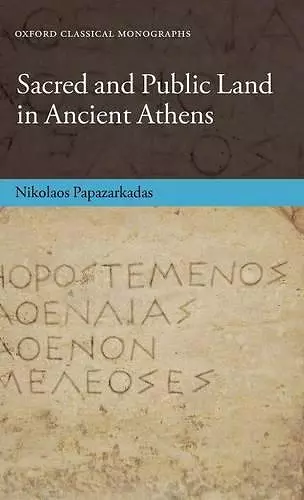Sacred and Public Land in Ancient Athens
Format:Hardback
Publisher:Oxford University Press
Published:13th Oct '11
Currently unavailable, and unfortunately no date known when it will be back

Landed wealth was crucial for the economies of all Greek city-states and, despite its peculiarities, Athens was no exception in that respect. This monograph is the first exhaustive treatment of sacred and public - in other words the non-private - real property in Athens. Following a survey of modern scholarship on the topic, Papazarkadas scrutinizes literary, epigraphic, and archaeological evidence in order to examine lands and other types of realty administered by the polis of Athens and its constitutional and semi-official subdivisions (such as tribes, demes, and religious associations). Contrary to earlier anachronistic models which saw sacred realty as a thinly disguised form of state property, the author perceives the sanctity of temene (sacred landholdings) as meaningful, both conceptually and economically. In particular, he detects a seamless link between sacred rentals and cultic activity. This link is markedly visible in two distinctive cases: the border area known as Sacred Orgas, a constant source of contention between Athens and Megara; and the moriai, Athena's sacred olive-trees, whose crop was the coveted prize of the Panathenaic games. Both topics are treated in separate appendices as are several other problems, not least the socio-economic profile of those involved in the leasing of sacred property, emerging from a detailed prosopographical analysis. However, certain non-private landholdings were secular and alienable, and their exploitation was often based on financial schemes different from those applied in the case of temene. This gives the author the opportunity to analyze and elucidate ancient notions of public and sacred ownership.
In this ambitious and often erudite book, Papazarkadas takes up the challenge of elucidating the origins and nature of land (as well as built structures) that fell under the control or ownership of various corporate entities, ranging from phratries and demes to the polis itself as a manager of land ascribed to one deity or another * William S. Bubelis, Bryn Mawr Classical Review *
[an] admirable book ... [Papazarkadas] showcases the relevant literary and lexicographic evidence ... he is scrupulous in not pushing this evidence, often fragmentary and/or problematic in other ways, further than it can properly go; unfailingly polite in assessing the work of his predecessors in the fi eld; and disarmingly modest when making his own (many and various) contributions to the topic. * David Whitehead, Classical Review *
so far the most important work on the subject of land leases in Classical Athens and it will hold that position for many years to come. The amount of evidence he discusses (some of which he is the first to bring to scholarly attention) must astound even the most stringent of readers. * Przemyslaw Lukasz Siekierka, Eos *
ISBN: 9780199694006
Dimensions: 224mm x 148mm x 27mm
Weight: 636g
416 pages